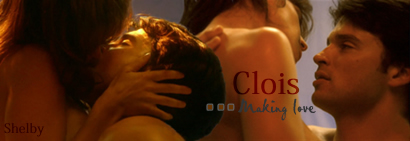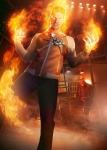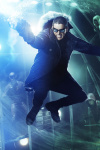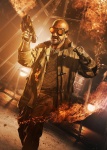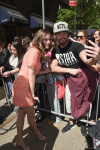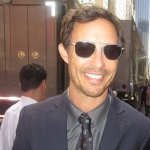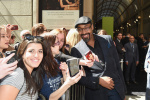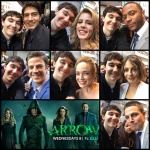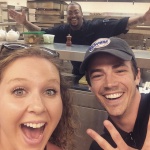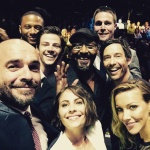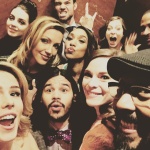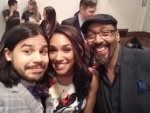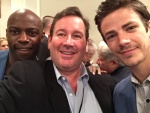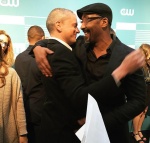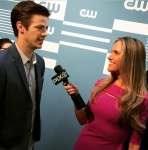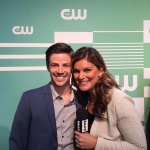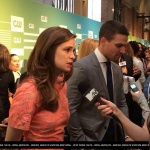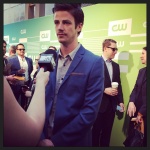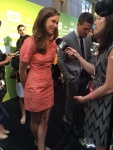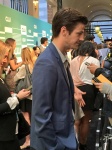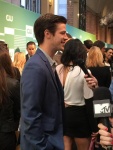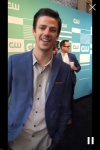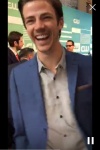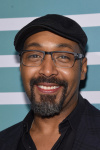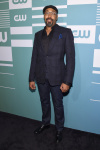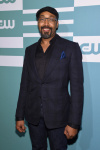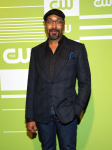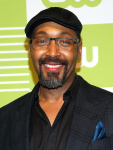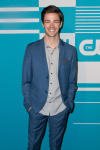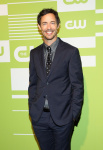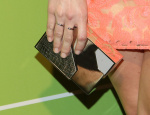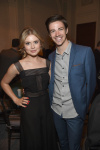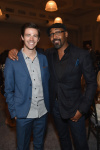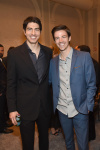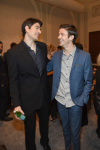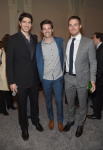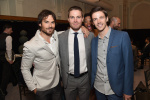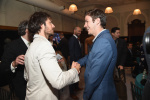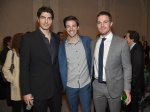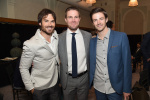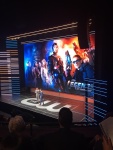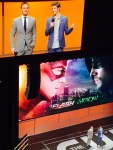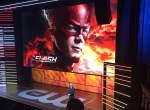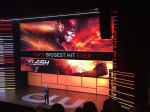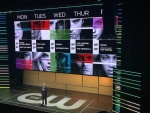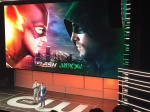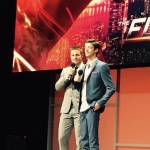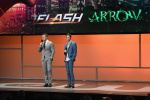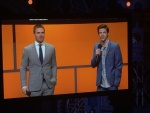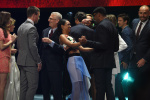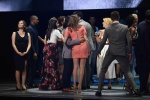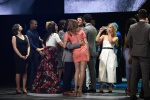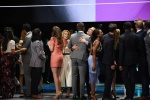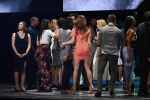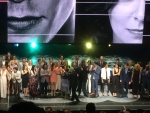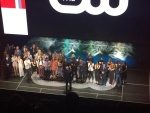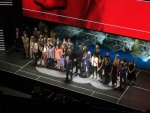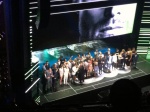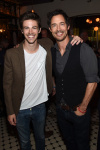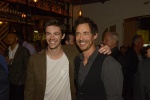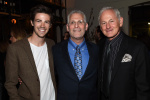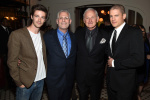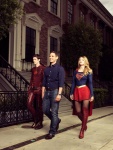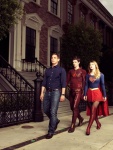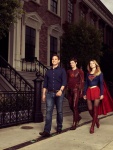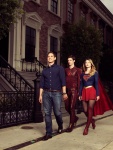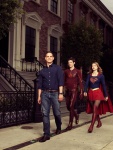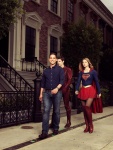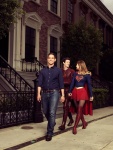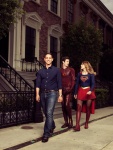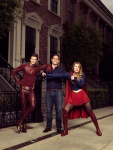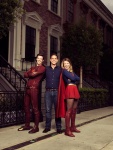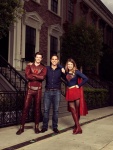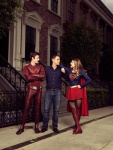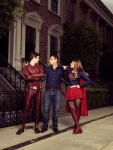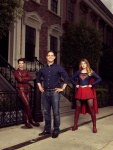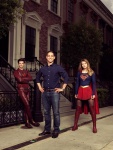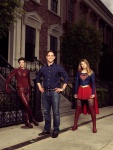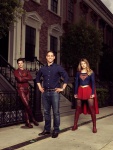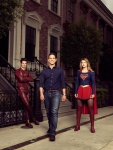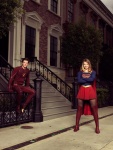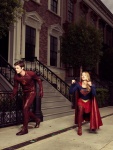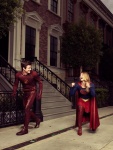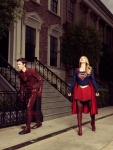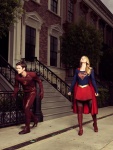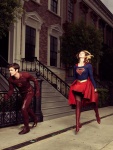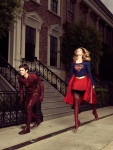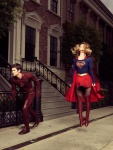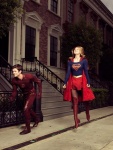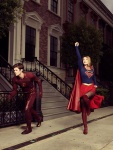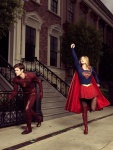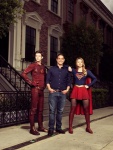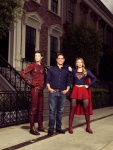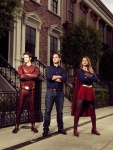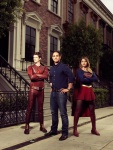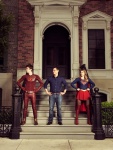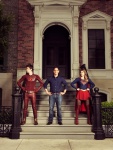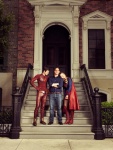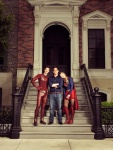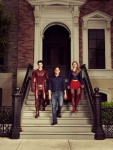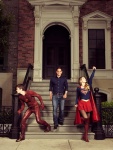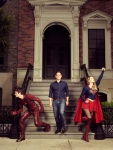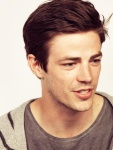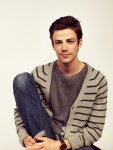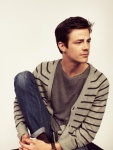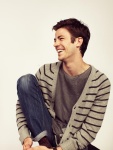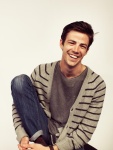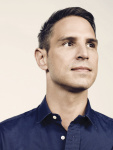Tom Cavanagh dice, "Es refrescante el ser Eobard Thawne"
Por Scott Huver 11 Mayo, 2015
In case you had any doubt, it's no more Mr. Nice Guy for "The Flash's" Tom Cavanagh.
With the storylines of The CW's superhero hit racing ahead at their usual breakneck pace, Cavanagh has left the kindler, gentler facade of Dr. Harrison Wells miles behind him and is instead moving forward full-throttle as the far more manipulative, Machiavellian Eobard Thawne, a.k.a. the Reverse-Flash, who's done away with his wheelchair, all pretense of benevolence and everything else but Wells' face in his final bid to travel back to his proper time period.
As the finish line of the season finale rapidly approaches, Cavanagh spoke candidly with CBR News about the game plan he's followed to create his character-within-the-character, and the rewards he's found in re-imagining the Reverse-Flash for TV as Barry Allen's ultimate adversary.
CBR News: This last batch of episodes must have been fun because you got to really reveal who this guy is.
Tom Cavanaugh: Yeah, it's great. It's been exceptionally enjoyable because it's the reason I signed on to do the show. When it's Eobard on the screen, you're basically seeing the most honest version of the character I've been playing all season long. This is who he really is, and that character, Eobard Thawne, has been the starting point for everything I've done. I've been undercover as Harrison Wells or when I've been the pre-taking over the Harrison Wells [identity] -- all of those things have been as their starting point Eobard Thawne. So, to get to do it, if you watch it the way we're trying to deliver it, there's a real enjoyment here, and that's because he is who he is. He's not hiding anymore. It's not an act. It's like, "Okay, here we go." It's freeing to be Eobard. It's really enjoyable to play.
I feel like the characters as well as the audience are in shock and mourning the loss of the Harrison Wells they knew. Do you miss Wells at all?
Playing Harrison is still a part of what I do. It's like, that's the clinical, scientific, smartest guy in the room part of the persona, and the other stuff that you see with Eobard Thawne was very much undercover. It doesn't mean that the science, smart aspect is now gone. It just means that the other one is allowed to flourish. So no, I don't miss Harrison Wells. [Laughs] I really enjoy playing Eobard, The Reverse-Flash was the reason I decided to do the show, and Eobard has been my starting point for everything I've done character wise up to this point. It's clean and simple, and it's fun to do right now.
When Matt Letscher was brought in as the original form of Eobard Thawne, did you have conversations with him to create a throughline between your performances?
Yeah, absolutely, and I think if you watch Matt's performance, you can see it. We definitely got together -- I know Matt, we worked together before on another Berlanti/Kreisberg show. Matt's tremendous, and Matt was very much into the idea of having -- he was like, "How do you see this scene? How do I see the scene?" And we would put our heads together and confer. I think it shows up in his performances. Eobard is someone who's using his persona -- he's two, three steps ahead, so he's not one of those guys who flailing and screaming and shouting. He's under control. I thought Matt brought that control, and when I play it, that's in my head. It's one of the governing attitudes that Reverse-Flash has, that control and that intelligence. I think Matt did a tremendous job putting that on screen.
Through that genetic camouflage situation, did any of the good of the real Harrison Wells seep over to Thawne, or is he just that good a liar?
Well, I don't think that anything seeped over. I honestly never really approached it -- certainly, he's covering up some things, but in terms of lying, if they're lies, they're lies of omission, because Eobard has this simple, single goal: to get home. He's stranded here, and been stranded here for 15 years. He doesn't have the juice he needs to get home, so what does he have to do? He has to create the juice, use that speed force. How does he do that? He creates The Flash -- that's Barry Allen. And the other people, Cisco, Caitlin, they're all shepherding this goal along with him. He had genuine affection for them because there are obstacles and conflicts that they encounter along the way that will obstruct him getting what he wants. And the team, together, will become those obstacles. And they do it together.
Along the way, they bond. Their personalities are revealed, and he's an intelligent person: I think he sees these people for what they're worth. And so, if anything were to happen to Barry Allen, Eobard's plan would explode. His genuine concern, vested interest in Barry's well being and Barry's improvement as the Flash -- he has genuine appreciation for Caitlin's ability to protect Barry Allen, genuine appreciation for Cisco's ability to build the technology that's going to help him achieve his dream.
All those things -- we'll see it in an upcoming episode, where it's not a lie to say that he's grateful to them and has tried to help them as best he can, and improve their lives. It makes him not a straight villain, and it makes it enjoyable to play it. It adds layers to it, because if he was just lying and said, "Ha ha, I'm not going to tell these people! I'm just going to use them." It would be much less complicated. To allow him to have affection for Cisco and to appreciate Caitlin and to want to protect Barry, it makes it that much more measured and much more of a fracture. We still have to split ways in order to get home. He is, above all, a guy just trying to get home.
It's been fascinating to watch you play all those different shades. Tell me about literally being in the yellow suit and doing those scenes with Grant.
Well, that's the most fun. That is the reason I signed on to do this show. Putting on a suit, when you're doing a superhero show, and you're putting on a suit in 2015 which has been put together by such incredible craftsmen and craftswomen in the costume department, it's like, this is not the spandex of yore. [Laughs] That just is just so much fun. Both Grant and I, I would say, really appreciate the physical aspect of it. He's excellent at it, in my opinion. I love doing it as well. But if you kind of enjoy that kind of thing, that physical part of it, essentially, what you have is sanctioned and paid play. And I find it to be tremendously gratifying and overt fun.
I feel like every actor should have a shot, if you like that kind of thing, at doing a Marvel movie or DC show or one of those superhero things where they get to put on a cape and fly around a bit. I think everyone should experience that pleasure, because it's really -- it's a tremendous ride.
We're in the home stretch of Season One -- what do you want to put out there to tease what's around the corner for the show's audience?
I don't really want to put anything out there! I think that they're doing it themselves, that I've noticed. I think we, as cast members, find that gratifying, humbling, all these people who understand the show as much as we do and are so interested in finding out the fates of these characters week to week. The reason that we get to keep doing it -- and, as you know in the world of television, more often than not, that is not promised to you, and you don't get to keep telling the stories. And so to be in the smaller percentage to keep telling the story, and the fact that it's this story, the story of The Flash, we're just grateful. I think we put a lot of thought and a lot of effort into the next couple of episodes knowing that we want to present the audience with this gift. We feel like we've gone out and got a really good one. I think we're really eager to hand it over and have them unwrap it.
For you, what's been the most unexpected or intriguing part of this experience?
I think one of the more surprising aspects of it is how welcoming the most avid fans have been, rather than, let's say, finding reasons to be divisive because liberties that we might have taken. For me, Harrison Wells is kind of an introduction, a new character, and yet that was not met with like, "Wait a minute! This isn't in the mythology!" I feel like they've been welcoming and receptive. I think they seem to understand that the more we start telling these kinds of stories, hopefully, the more will be out there. It makes for good business for all who are fans of it.
And then, on top of that, I feel like I've been surprised at the demographics of the viewership. I think that initially going into it, I thought we would reach a much smaller demographic than we have, but on the streets -- Jesse and I were talking about this yesterday. We both live in New York -- and on the streets, the people that come up to you nowadays, it's just essentially a cross-section of a subway car. It's all walks of life. It's impressive. It's elderly and young. It's mothers and fathers and sons and daughters, all together, kind of watching this thing. And I don't know that I necessarily expected that, in terms of the demography of that. I didn't think it would be that wide a reach. That's been surprising and pleasant.
One thing that was interesting was how great you established chemistry with Grant and the S.T.A.R. Labs team, and then got to flip it on its head with the reveal.
Well, I think we all knew where it was headed -- or at least, I did. We were always on that track, always looking forward to get there. Because, leaving myself out of it early on, we really had to add a bit of a pace. This comes from having done like three shows with Greg, and the other two shows were not as long lasting as we would have hoped -- that's just the nature of television.
"The Flash" is dear to Geoff Johns, Andrew Kreisberg, Greg Berlanti -- The Flash is really dear to them. I'm not talking professionally -- I'm talking personally. This is a story that they really want to tell, with the understanding that you might not get a lot of chance to tell too much of the story because in television, things get cancelled, etc. They're like, look: if we're getting one season of this, or 13 episodes of this, then we're going to tell a story we're going to be proud of, even if it's only just 13. So we came out of the gate in a reveal rush with our conception pilot.
Then early, after Captain Cold, there's all these people [on the show], and I said to Berlanti, after [Episode] Seven, "Um, are we at all worried about story?" And Greg goes, "There's always more story." One of the nice options of that is we're not -- oftentimes in television, when you do a pilot, and the pilot is successful so then you have to go to the next one and repeat when you did in the pilot, and there's been no interest in that. It's like we're moving forward in leaps and bounds.
In Episode Two, Harrison Wells kills a guy. In Episode Nine, he reveals the man in the yellow suit, just like that. Episode Eleven is "Who is Harrison Wells?" We're trying to find out what's going on. And Episode Fifteen, Barry tells Iris who he is. I stand up in front of Caitlin and reveal Harrison Wells and walk. I kill Cisco. Barry saves the town from a tidal wave. It's like, "What's going on?" And that's one of the great things about doing this genre, what it can allow you to do. You don't need to have a massive amount of backstory to bring a guy in who can control the weather. We can just do it -- and we do. That's been a really, really, extremely gratifying way to do television.
We don't take things too seriously. We try to get as much story out [as possible]. We get a lot of it out, so that when people sign on for our hour of television, they're not going to be sitting there, bored. We're going to give them stuff. Like, last week's episode, to me -- I was watching the Grodd thing, and I mean, this is the stuff that used to be on the big screen. You couldn't do that. You couldn't pull a guy up out of the sewer and have him like lean in and say, "Grodd hate banana." You couldn't do that. And now, you can. We're benefactors of that technology in this digital age, and we're like trying to take advantage of all those effects and all the heart and comedy we can, all at once. We're trying to tell the story, because at some point, it's going to be taken away from us. We want to have done as good as job as we can while we've been given the opportunity.
http://www.comicbookresources.com/artic ... ard-thawne 

